 Record Format Database
Connection
Record Format Database
Connection Record Format Database
Connection
Record Format Database
ConnectionCommand |
Path |
Record Format Connection |
Tools > Database |
Each field of the record format needs to be mapped to the appropriate database table column. Required record formats that do not yet exist in the file can be created when connecting the records to the database. IFC/COBie entities can also be created and connected by linking their properties to the database table. The record connections can be saved in an xml file and imported into another file.
Record formats can be automatically created and linked to the database table; see Automatically Creating Record Formats from a Database Table.
To connect the desired record format to the database table:
Select the command. Alternatively, select a record format in the Data tab of the Object Info palette for a selected object with the desired record attached, and then click Record Format Database Connection.
The Record Format Database Connection dialog box opens, showing available record formats in the file. These records consist of Document (user defined), Parametric (related to parametric objects), or IFC (IFC and COBie records). Each record format can be linked to a data source that has already been connected to the file.
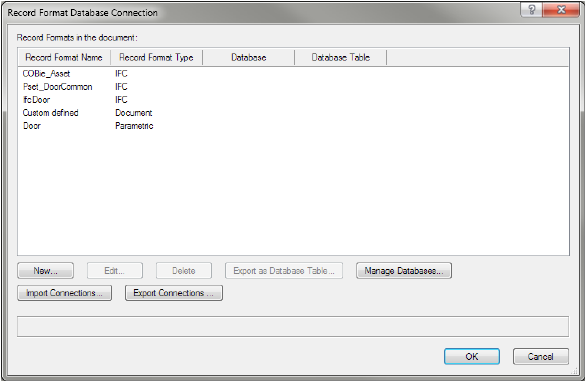
 Click
to show/hide the parameters.
Click
to show/hide the parameters.
If a parametric or document record is to be connected, select the record format and click Edit. If an IFC entity is to be connected, see Creating or Editing and Connecting IFC/COBie Properties.
The Edit Record Format dialog box opens, with additional database controls available due to the presence of the database connection.
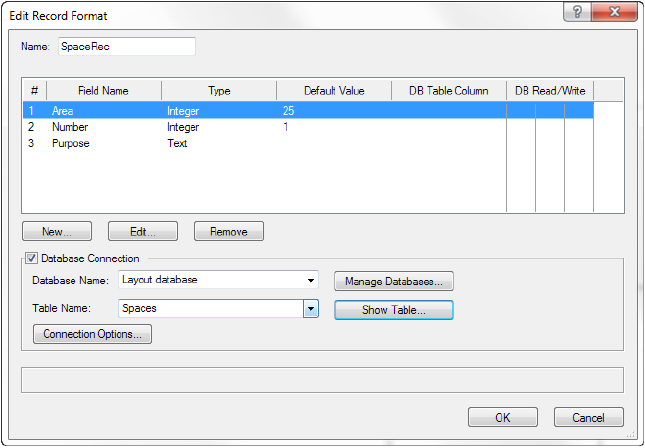
Select Database Connection to link the record format fields to the selected database and table. This area only displays for record formats when a database is connected in the file.
If needed, verify or change the connected database by clicking Manage Databases, or check the table selected in Table Name to view the table contents.
Click Connection Options to specify database connection update options.
The Connection Options dialog box opens. Select the actions to occur in the database table when the connected record format, or object with the record attached, is edited. (These changes occur at the time of database update set in Specifying Update Settings; alerts inform you of any changes to the database.)
 Click
to show/hide the parameters.
Click
to show/hide the parameters.
Click OK to return to the Edit Record Format dialog box.
For each record field, assign a column from the selected table. Select a record field and click Edit.
The Edit Field dialog box opens.
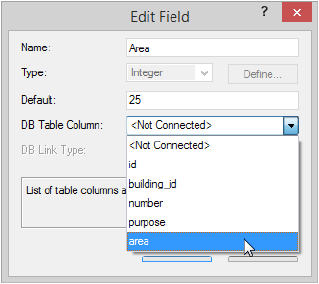
Select the associated table column from the database in DB Table Column, and select the method of database communication in DB Link Type.
● Read/Write: Allows data to move in both directions between the database and the Vectorworks file.
● Read Only: Allows database information to be read into the Vectorworks file, but does not allow record data to modify the database.
● Write Only: Allows the Vectorworks file data to modify the database, but does not allow the database information to modify the Vectorworks record field.
Click OK to return to the Edit Record Format dialog box. The dialog box updates to display the associated table data and link type.
Click in a DB Read/Write column to easily change the link type for the selected row.
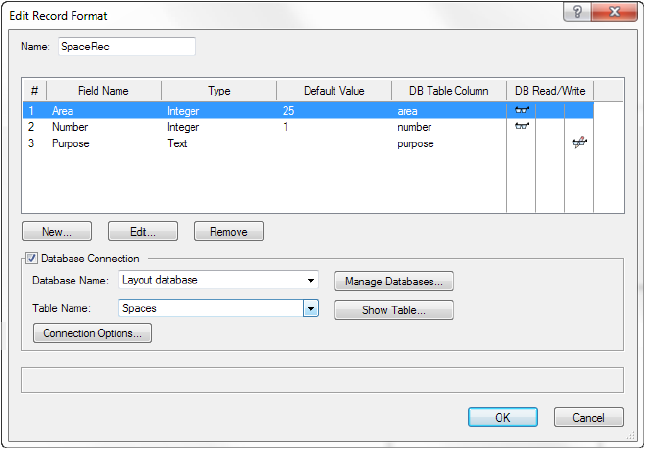
Once the data has been linked for each record field, click OK. The fields in the record format have now been linked to the table data in the specified database, and the link type has been defined. On the Data tab of the Object Info palette, connected record formats display with the name of the connected database and its table.
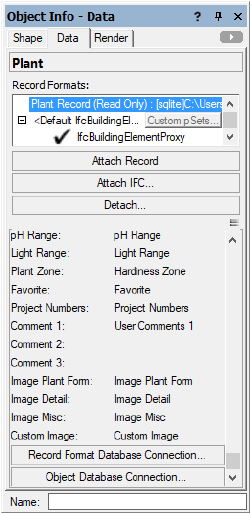
As mentioned in the previous section, IFC entities that do not yet exist in the file can be created when connecting properties to a database. In addition, the properties of existing entities can be edited. The process is different when creating or editing IFC/COBie record formats. For IFC/COBie, instead of linking record fields to a database, properties are connected.
An alternative, advanced way to link IFC/COBie records to external databases is to link the database to your custom record format(s), and then use the IFC Data Mapping command to map IFC fields (from an IFC entity or psets) to the custom record fields. There is no need to populate all objects with IFC Data (no need to use the Eyedropper tool, or open the IFC Data dialog box). If you use symbols, you can choose different IFC mapping options for each symbol definition according to the attached record format.
To create or edit an IFC/COBie record format:
From the Record Format Database Connection dialog box, click New to create a new record format, or select an IFC/COBie record format and click Edit to edit the format.
The New IFC/COBie Record Format dialog box or the Edit IFC/COBie Record Format dialog box opens. When creating a new IFC/COBie format, select the entity from the list to display its properties and connect them. When editing an IFC/COBie format, the entity is already selected so only its properties display for editing connections.
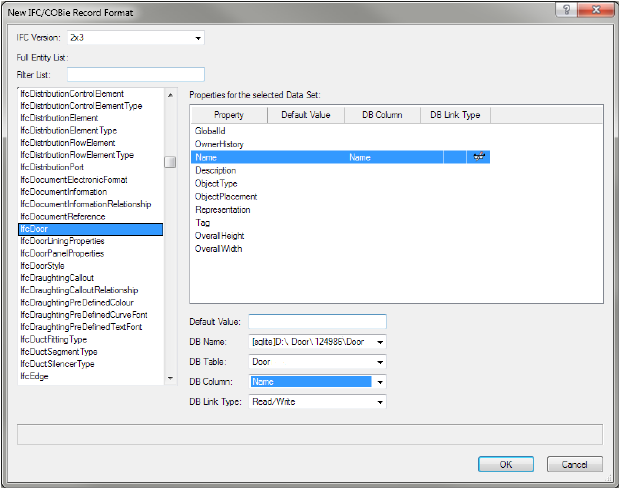
 Click
to show/hide the parameters.
Click
to show/hide the parameters.
Select each property to connect, and specify any default value.
Select the connected database to use, and assign a database table from the selected database. Select the associated table row from the database.
Select the method of database communication in DB Link Type:
● Read/Write: Allows data to move in both directions between the database and the Vectorworks file
● Read Only: Allows database information to be read into the Vectorworks file, but does not allow the property to modify the database
● Write Only: Allows the Vectorworks file data to modify the database, but does not allow the database information to modify the Vectorworks property
Click in a DB Read/Write column to easily change the link type for the selected row.
Click OK to return to the Record Format Database Connection dialog box. The dialog box updates to display the associated database.
~~~~~~~~~~~~~~~~~~~~~~~~~